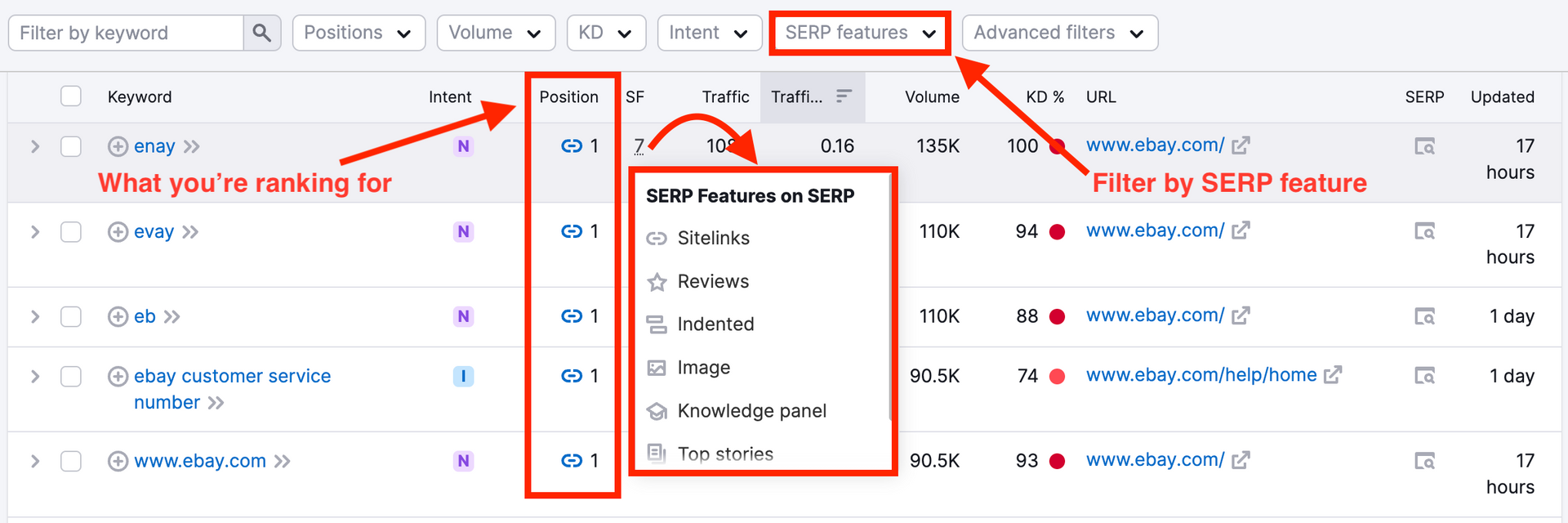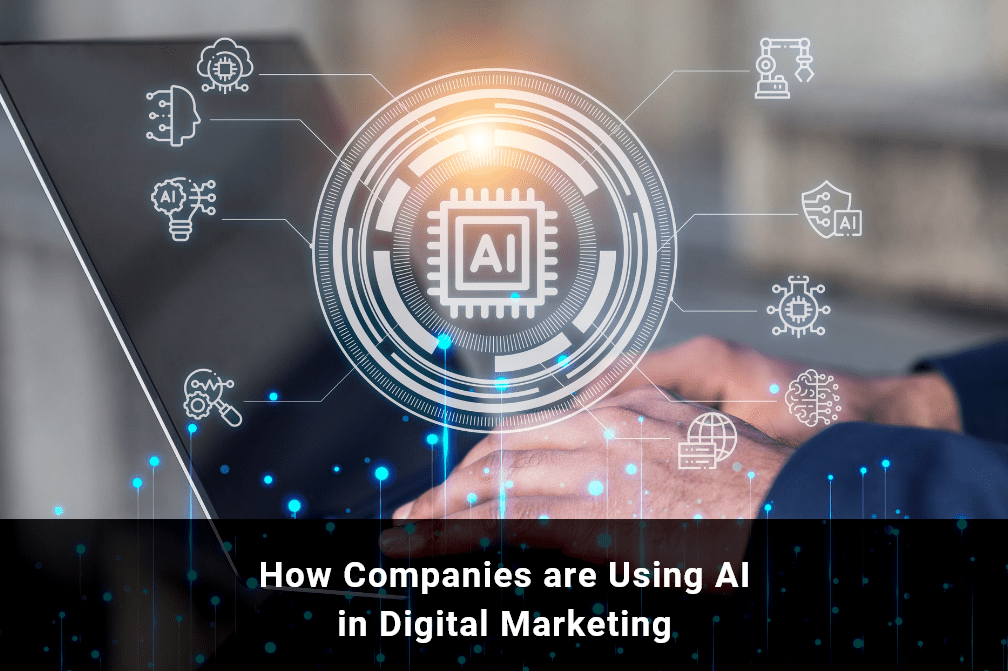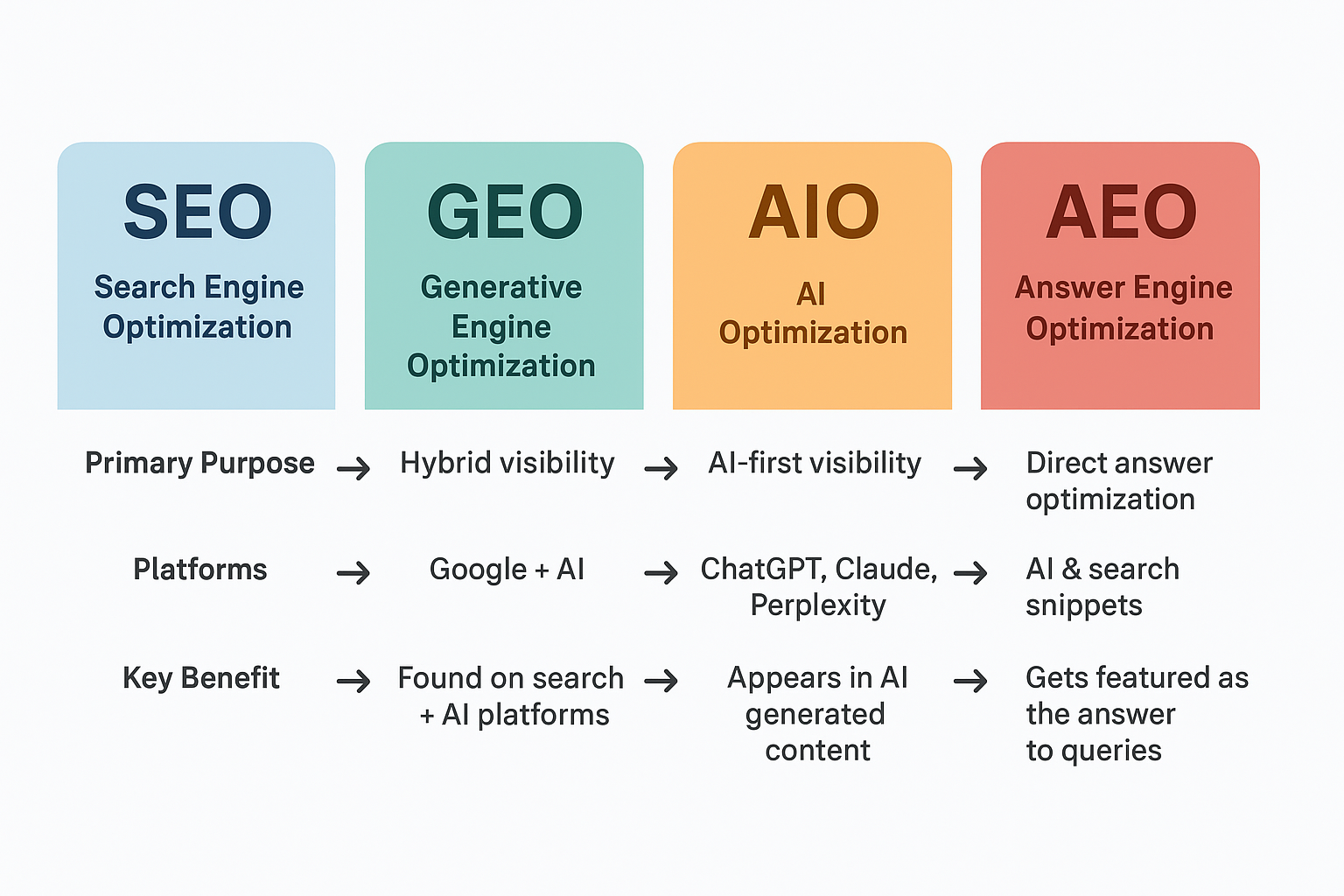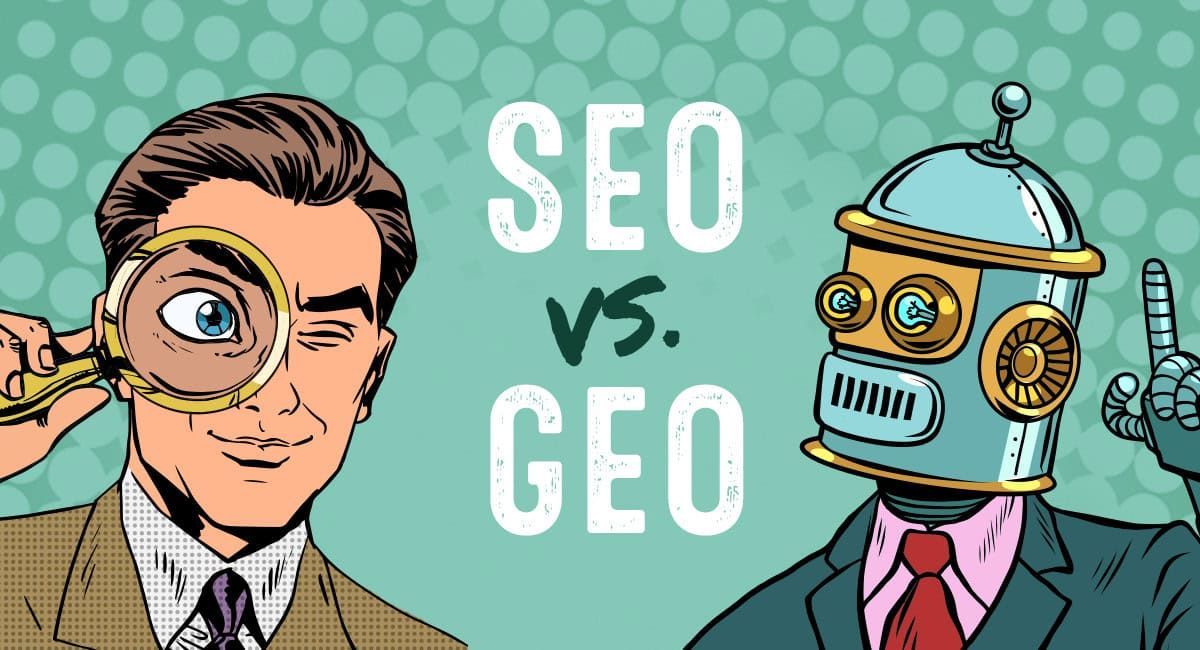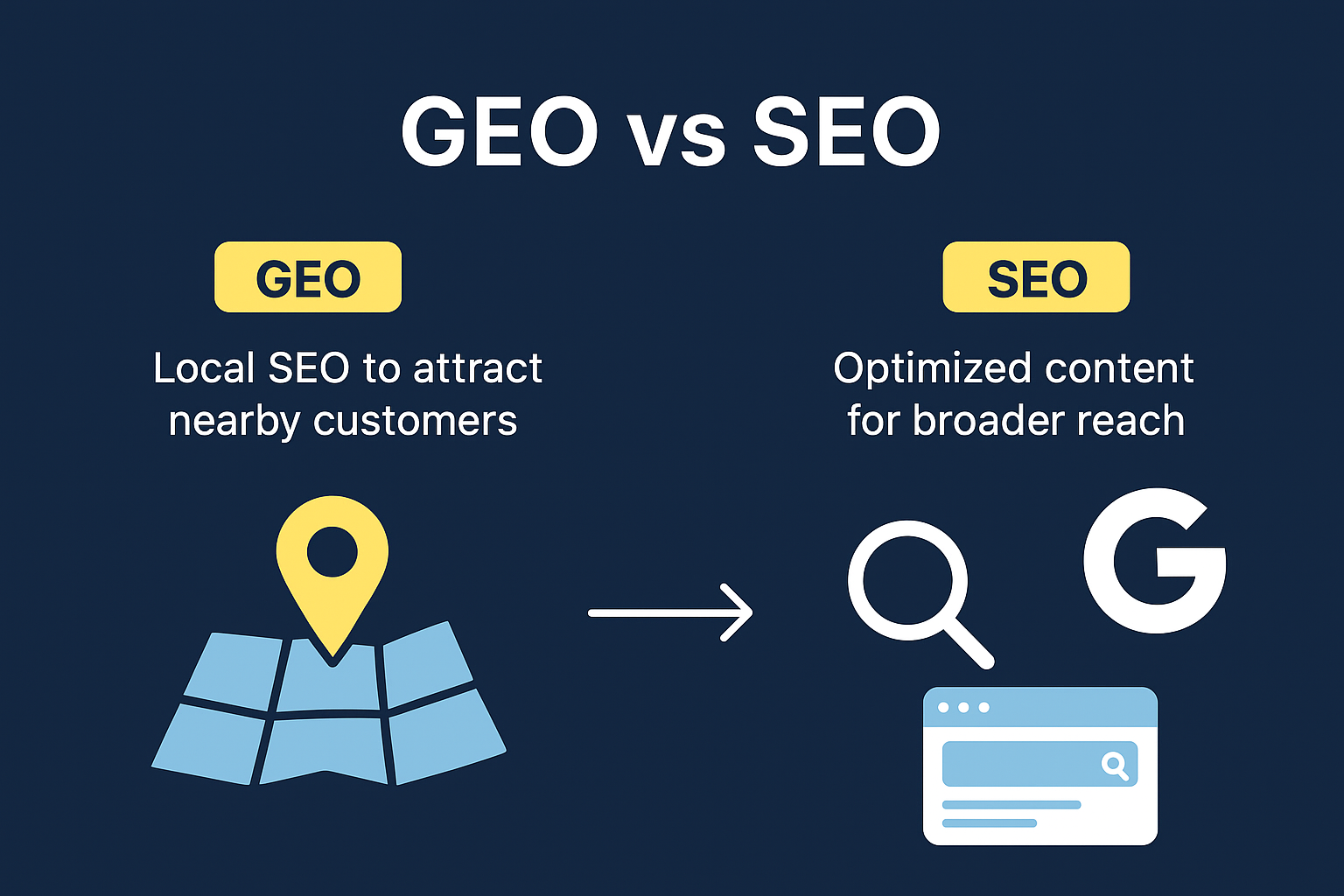GEO, Generative Engine Optimization vs SEO, Search Engine Optimization, What Does the Future of Online Search Look Like?
As the digital landscape continues to evolve, so do the search strategies, paid and organic, that businesses employ to enhance their online visibility.
Two acronyms that are becoming increasingly important in this context are GEO (Generative Engine Optimization) and SEO (Search Engine Optimization).
While SEO has long been the cornerstone of online marketing, GEO represents a shift in how we define and approach optimization in our quest for digital relevance.
This article takes you into the nuances of these two methodologies and speculates on the future of online search.
Understanding SEO Search Engine Optimization, or SEO, encompasses a large set of practices aimed at improving a website's visibility on search engines like Google, Bing, Yahoo, GoDuckGo, and now Chat GPT & Preplexity AI search. Google also has an AI Mode.
The primary goal of SEO is to ensure that a website ranks high in search engine results pages for relevant keywords and high-quality content with high authority backlinks, increasing organic traffic quickly.
Traditional SEO strategies encompass keyword research, high-quality content creation, backlink building, and technical optimization.
These methods are crucial for driving traffic but often yield results that are heavily dependent on evolving algorithms and competition.
Introducing GEO Generative Engine Optimization (GEO) is a relatively new concept that leverages artificial intelligence and machine learning to dynamically optimize content and user experience. Unlike traditional SEO, which focuses on static keywords and page elements, GEO takes into account user intent, brand and content generation in real-time.
This method can significantly enhance personalization in search results, making the user experience more intuitive and tailored to individual preferences.
Key Differences Between GEO and SEO
1. **Focus on Intent vs. Keywords**: While SEO primarily revolves around targeted keywords, GEO emphasizes understanding and catering to user intent. This shift allows for more relevant search results based on context rather than strict keyword matches.
2. **Dynamic Content vs. Static Pages**: GEO enables the generation of content that adapts to user queries in real-time. In contrast, SEO typically relies on pre-existing, static content that must be regularly updated to keep up with changing user demands.
3. **Data-Driven Insights**: GEO utilizes advanced analytical tools to learn from user behavior and optimize search results. SEO can incorporate these insights, but is often slower to react due to its reliance on established practices and techniques.
The Future of Online Search: The evolution of online search will likely be characterized by a blend of GEO and SEO strategies.
As technologies continue to advance, search engines may prioritize personalized, dynamic content over traditional SEO practices. This transformation will necessitate a shift in how marketers approach their online strategies, as well as a willingness to adopt new tools and methodologies.
In the near future, businesses may need to embrace a more holistic digital marketing approach—combining the best aspects of SEO with the adaptability and innovation offered by GEO, AEO, AIO, AI search engines.
This integration will enable companies to understand their customers' evolving needs better and enhance their online presence in meaningful ways.
As we look ahead, the interplay between GEO and SEO will shape the digital marketing landscape. While SEO has served as a foundational element of online search strategy for years, the rise of GEO underscores the importance of adapting to new technologies and user expectations.
For any online or brick and mortar businesses wishing to remain competitive in an increasingly digital world, understanding and implementing both AI search & SEO strategies will be crucial. As these methods continue to develop, the ability to think critically about how we optimize for search engines will ultimately determine success in attracting and retaining customers.
The future of online search is bright, and those who can navigate this shifting paradigm will undoubtedly stand out in a rapidly overcrowded marketplace. For further insights on how these changes may impact your business, contact Mobile OPZ at 720-492-9625 or visit our website at
MobileOPZ.com.
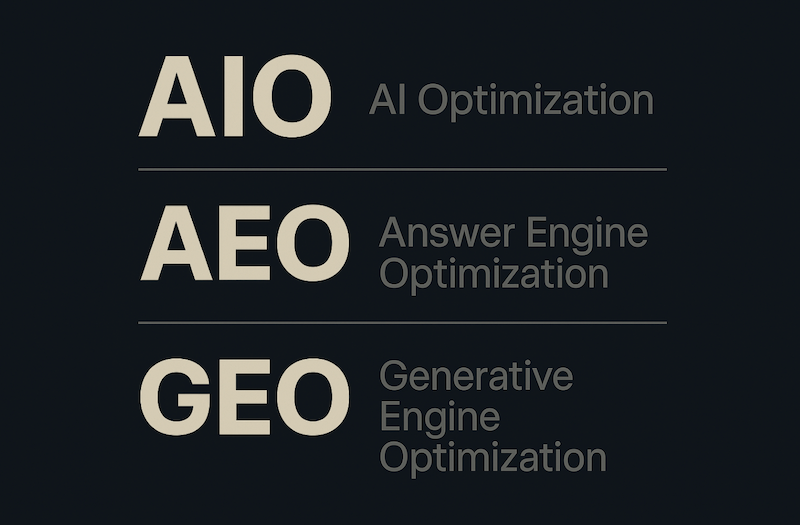
Understanding the Future of Search: GEO, AIO, and AEO. As we navigate this ever-evolving digital landscape, the need for brick-and-mortar businesses to optimize their online presence becomes increasingly critical. In this context, three acronyms stand out:
GEO (Generative Engine Optimization), AIO (AI Optimization), and AEO (Answer Engine Optimization). Each represents a distinct approach to enhancing discoverability, relevance, and user satisfaction in search engine results.
Generative Engine Optimization (GEO) GEO refers to the strategies and techniques that focus on optimizing content for generative engines, which include not only traditional search engines but also advanced AI-driven platforms capable of producing content.
With the fast rise of natural language processing and generative AI, businesses must ensure their content aligns with the algorithms that drive these technologies.
This requires a profound understanding of semantic search and the use of contextual clues that guide generative models in producing relevant outcomes for users.
To effectively implement GEO, organizations should prioritize high-quality, contextually rich content. This includes utilizing structured data and ensuring that all media elements—text, images, and videos—contribute to the overall user experience.
By aligning content with the intent of potential clients, businesses can improve their visibility in search results that utilize generative capabilities.
AI Optimization (AIO) AIO focuses on optimizing for AI-driven processes and data interpretation used by search engines.
It encompasses various strategies, from enhancing machine learning algorithms' understanding of content to fine-tuning how data is indexed and retrieved. As AI continues to evolve, web admins and content creators must adopt new practices to ensure their content remains competitive.
Among the key elements of AIO are keyword strategy evolution and user experience enhancement. With AI increasingly understanding user intent, it’s crucial to craft content that speaks directly to the user their needs and queries.
This means going beyond traditional keyword stuffing and concentrating on natural language patterns and synonyms that reflect how users articulate their searches.
Answer Engine Optimization (AEO) With the advent of voice search and digital assistants, AEO has undoubtedly emerged as a critical focus.
This type of optimization revolves around providing clear, direct answers to users' questions. The goal is to not only appear in search results but to deliver succinct, valuable information that can be quickly accessed and understood.
To effectively optimize for AEO, businesses need to analyze common user queries related to their industry.
This involves creating FAQ sections, clear headings, and structured snippets to address user questions directly. Engaging in this level of insight enables businesses to establish brand authority and drive traffic to their websites, ultimately creating a more seamless user experience.
The dynamic landscape of search engine optimization challenges businesses to stay ahead of emerging trends. GEO, AIO, and AEO each present unique strategies that can significantly impact visibility and user engagement.
By prioritizing these optimization techniques, companies not only enhance their search results performance but also align themselves with the future of digital interaction.
As John Mueller often emphasizes, understanding the intent behind searches and delivering relevant content is crucial in today’s market. Businesses that embrace these GEO, AEO, and AIO search methodologies will be well-positioned to thrive in an increasingly complex digital environment.
Google's John Mueller has another idea and suggests AI Acronyms may lead to Scams and Spam, read it here, https://www.seroundtable.com/google-ai-seo-acronyms-scams-spam-39942.html
For businesses looking to enhance their brand's online presence and navigate these complex optimization strategies effectively, consulting with experts in the field is invaluable.
Seek insights, conduct thorough analyses, and implement changes that prioritize user experience and engagement. ---
By focusing on the key elements of each optimization type, this article aims to provide a profound yet insightful overview of current best practices. Let me know if you want to dive deeper into any specific area or if you have any other requests.
AI Search Engine, How do They Work?
AI Search Engines: How Do They Work? In what seems like no time at all, artificial intelligence (AI) has dramatically transformed the overall landscape of search engines, enhancing the way users interact with information.
Search engines powered by AI leverage complex algorithms, learning systems, and vast amounts of data to deliver more relevant results and improve user experience.
Understanding the mechanics behind AI search engines is essential for anyone looking to navigate the digital landscape effectively.
The Fundamentals of AI Search Engines at their core, AI search engines utilize machine learning (ML) techniques to analyze and interpret data.
Unlike traditional search engines, which rely primarily on keyword matching, AI-driven systems incorporate a variety of factors to ascertain the intent behind user queries.
This involves natural language processing (NLP), which will allow the system to understand and respond to human language nuances, making search interactions more intuitive.
Algorithms and Data Processing: The algorithms used by AI search engines are in a constant state of learning from user interactions.
For example, when users click on a link, spend time on a page, or return to the search results, these actions feed the algorithm valuable data about what content is deemed relevant or useful.
This continuous learning process enables search engines to refine their results over time, moving closer to delivering a personalized search experience. In addition to user interactions, AI search engines process vast datasets available on the web.
The ability to crawl and index this information quickly is critical to maintaining up-to-date results.
Advanced AI techniques such as deep learning enable search engines to uncover patterns within this data, enhancing the quality of search results exponentially.
Enhancing User Experience AI search engines prioritize user experience by delivering not only relevant results but also anticipating user needs. Features like autocomplete suggestions, voice search optimization, and context-aware results are direct benefits of AI integration.
These enhancements support users in discovering information more organically, transforming the search process from a mere query into a more engaging exploration.
Moreover, the advent of conversational AI has paved the way for AI chatbots and virtual assistants to assist in search-related tasks, allowing users to engage in a more interactive dialogue with the technology.
This adds another layer of personalization, as these large language systems can learn user preferences over time and adjust their responses accordingly.
The Future of AI in Search and the evolution of AI search engines is ongoing and promises to continue reshaping how we seek and consume information.
As machine learning models become more sophisticated, faster with quantum and capable of understanding context and sentiment, the potential for delivering even more relevant search results is immense.
We expect to see advancements that allow search engines to predict queries based on user behavior and preferences, further smoothing the interaction between users and information.
AI search engines represent a significant leap forward in information retrieval, fundamentally changing not only the technology behind search but also how users engage with digital content.
As the field continues to innovate, understanding these systems' workings will be essential for businesses, marketers, and consumers alike.
Keeping an eye on this evolving landscape—much like John Mueller from Google often emphasizes—will be pivotal for anyone looking to harness the power of AI in their search strategies.
For those interested in further exploring this topic or seeking expert insights, feel free to reach out to Mobile OPZ at 720-492-9625
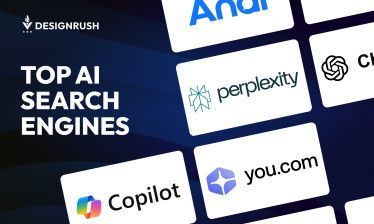
The Rise of AI Search Engine Optimization Tools: Transforming Digital Marketing. In the ever-evolving landscape of digital marketing, artificial intelligence (AI) has emerged as a game-changer, particularly in the realm of Search Engine Optimization (SEO).
Businesses are increasingly turning to AI-powered tools to enhance their search visibility, streamline their processes, and gain a competitive edge.
Mobile OPZ goes over the various AI SEO tools available today, such as Chat GPT, Perplexity, and Claude AI, and how they can benefit your digital marketing strategy.
Understanding AI in SEO: AI technology has revolutionized how we approach SEO.
Traditional SEO methods rely heavily on manual research, keyword analysis, and optimization efforts, often leading to time-consuming processes with inconsistent results.
AI tools, however, relieve you from these burdens by leveraging machine learning algorithms and vast datasets to provide AI insights that were previously unimaginable, saving you time and effort.
AI tools, however, leverage machine learning algorithms and vast datasets to provide AI insights that were previously unimaginable.
These AI tools analyze search patterns, user behavior, and content trends, allowing marketers to make data-driven decisions quickly and efficiently.
Key AI SEO Tools and Their Benefits
1. **Keyword Research Tools** AI-powered keyword research tools can identify relevant keywords and phrases that potential customers are searching for. Platforms such as SEM Rush offers advanced analytics that can predict trends and suggest keywords that will rank well, saving you time and improving content relevance.
2. **Content Optimization** Content is king in the world of SEO, and AI tools are making it easier to create optimized content. Tools like SEM RUSH can analyze existing content to suggest improvements based on keyword density, readability scores, and semantic relevance. This ensures your content meets SEO best practices while engaging your audience effectively.
3. **Site Auditing Tools** Regular site audits are crucial to maintaining SEO health. AI-driven auditing tools can evaluate your website’s technical aspects, identify errors, and provide actionable insights to enhance site performance. This can improve user experience and contribute to better search engine rankings.
4. **Competitor Analysis** Understanding the competition is vital for any successful SEO strategy. AI tools can help track competitors’ keyword strategies, content performance, and backlink profiles. This data can inform your tactics and help you stay ahead in a crowded market.
5. **Analytics and Reporting** AI tools streamline the analytics process by automatically generating reports that provide a clear picture of your SEO performance. Instead of sifting through raw data, marketers receive intuitive dashboards and insights, making it easier to adapt and optimize strategies.
The Future of AI in SEO As technology continues to evolve, so will the capabilities of AI in the SEO sphere. We can expect more sophisticated tools that not only analyze vast amounts of data but also predict future trends and consumer behaviors.
Embracing AI in your SEO strategy will not only enhance efficiency but also prepare you for the future of digital engagement, giving you a strategic advantage.
In conclusion, the integration of AI in SEO is not just a temporary trend but a significant shift in how businesses will approach online visibility.
The tools available today offer unparalleled insights and efficiency, and those who adopt them early will quickly reap the benefits of improved search rankings and enhanced customer engagement.
To fully leverage these tools, consider exploring options that align with your business objectives and online marketing strategies. For more information on incorporating AI SEO tools into your digital marketing efforts, feel free to contact us at 720-492-9625 or visit our website at MobileOPZ.com.
The future of SEO is here, and it’s driven by artificial intelligence. Don't miss out on this opportunity to revolutionize your digital marketing strategy with AI SEO tools.
Perplexity AI Search Engine Chat GPT AI Search Engine
Perplexity AI Search Engine vs. Chat GPT AI Search Engine: A Comparative Analysis. In the ever-evolving landscape of artificial intelligence, search engines powered by AI have emerged as pivotal tools for enhancing how we access and process information. Among the leading contenders in this arena are Perplexity AI and
ChatGPT AI Search Engine. This article seeks to provide an insightful comparison between the two, examining their features, functionalities, and overall effectiveness.
Perplexity AI Search Engine Perplexity AI distinguishes itself with a focus on contextual understanding and information retrieval. Its unique algorithm is designed to interpret nuanced queries, making it adept at providing precise answers.
This search engine not only retrieves basic information but also engages users by presenting related concepts, thereby encouraging more profound exploration of topics.
Perplexity's user interface is straightforward, allowing for an intuitive search experience without overwhelming users with unnecessary information. A key feature of Perplexity AI is its ability to synthesize information from multiple sources.
This means that users can expect well-rounded answers that consider various perspectives, giving researchers a comprehensive view of the topic. The engine's emphasis on accuracy and relevance makes it a strong choice for professionals and researchers.
On the other hand, the Chat GPT AI Search Engine leverages natural language processing to facilitate a conversational search experience. This platform is designed to understand user queries in a more human-like manner, responding with natural language that feels intuitive and engaging.
The interactive nature of Chat GPT allows for follow-up questions and ongoing dialogue, making users feel more engaged and involved in the search process.
This makes it ideal for users who prefer a more dynamic interaction when seeking information. One of the standout features of ChatGPT is its vast training data, which means it can draw from a wealth of information across various fields.
This capability enables it to handle diverse inquiries, from technical questions to creative brainstorming. However, users should exercise caution, as the accuracy of the information can vary, and verification from credible sources is advisable.
Both Perplexity AI and Chat GPT AI Search Engine offer unique advantages that cater to different user needs. Perplexity is ideal for those seeking precise, well-researched answers and a more traditional search experience, while Chat GPT excels in providing an interactive, conversational environment.
When choosing between these two powerful tools, users should consider their specific requirements and the type of information they wish to uncover.
As both Perplexity AI and Chat GPT AI Search continue to advance, the capabilities of search engines will undoubtedly evolve, leading to even more sophisticated tools in the near future.
Online searchers are encouraged to stay informed about developments in this AI search field to make the most of these valuable resources.
For further insights and detailed comparisons, please get in touch with Mobile OPZ at 720-492-9625.
Llms.txt is shaping your AI visibility
Llms.txt: Shaping Your AI Visibility on the Domain** In the fast-evolving landscape of artificial intelligence, understanding how to enhance your online presence is crucial for professionals and businesses alike.
Llms.txt stands as a beacon for those seeking to improve their AI visibility on platforms like Domain.
**What is Llms.txt?** At its core, Llms.txt is designed to optimize the way AI algorithms interpret your digital content. By defining parameters that guide the AI’s understanding of your Domain, you create a structured approach for improving search engine visibility and engagement with your target audience.
**Why Visibility Matters** In today's digital age, the visibility of your AI-related content is paramount. With the overwhelming amount of information available online, ensuring that your work stands out can influence your brand's success. AI visibility not only augments discoverability but also establishes credibility in a crowded marketplace.
**Key Elements of Llms.txt**
1. **Keyword Optimization**: Utilize targeted keywords within your Llms.txt file to guide AI algorithms to your content. This strategic use of language ensures your articles, blogs, and other digital assets are more likely to appear in relevant searches.
2. **Content Structuring**: A well-organized Llms.txt file plays a crucial role in content structuring. By categorizing your digital assets effectively, you improve not only AI visibility but also user experience.
3. **Analytics Integration**: Incorporating analytical tools into your strategy can provide valuable insights into how AI interacts with your Domain. Analytics Integration will allow you to refine your approach continually.
**Best Practices for Implementation** - Regularly update your Llms.txt file to reflect changes in your content strategy and maintain relevance.
Test different configurations to find what resonates best with your audience and meets your visibility goals. - Collaborate with SEO experts to ensure your strategy aligns with best practices and current trends.
Adopting Llms.txt as part of your digital strategy is not merely a technical step; it’s a crucial component for enhancing AI visibility within your Domain.
By implementing the strategies outlined in this article, you position yourself to leverage AI effectively, ensuring that your valuable work and contributions are recognized and valued in the AI community.
For more insights and tailored strategies, feel free to reach out at [Contact Information]. Stay informed, stay visible.
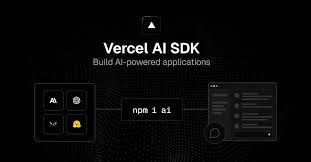
AI-Powered Search Engine Vercel: How Does It Work? In today’s fast-paced digital landscape, the need for efficient and intelligent search capabilities is paramount.
Vercel, renowned for its advanced web deployment techniques, has moved beyond traditional applications to harness the power of artificial intelligence in search technology.
This AI article aims to provide an in-depth understanding of how Vercel's AI-powered search engine functions and the innovative methodologies it employs.
Understanding AI-Powered Search At its core, an AI-powered search engine utilizes machine learning algorithms and natural language processing (NLP) to enhance the accuracy and relevance of search results.
Unlike traditional search engines, which often rely on keyword matching, an AI search engine understands user intent and context, enabling it to interpret queries more naturally.
Vercel’s approach incorporates several key components to achieve this sophistication.
Components of Vercel’s AI Search
1. **Data Processing and Indexing**: Vercel’s search engine processes vast amounts of data through an intricate indexing system. By analyzing content relevancy, structure, and usage patterns, it creates a dynamic index that optimizes search results based on user behavior and preferences.
2. **Natural Language Processing**: The heart of AI search lies in its ability to understand language. Vercel employs advanced NLP techniques to dissect user queries.
This allows the engine to comprehend nuances, synonyms, and even slang, ensuring that users receive the most relevant results, regardless of how they phrase their inquiries.
3. **Machine Learning Algorithms**: Continuous learning is vital for search engines. Vercel uses machine learning to track user interactions and outcomes, refining its algorithms to improve future search results.
Over time, the system evolves, adapting to changing user behaviors and preferences.
4. **Personalization**: One of the significant advantages of Vercel's AI search is its ability to personalize results. By leveraging user data, including past searches and interactions, the search engine tailors the experience for each individual, enhancing engagement and satisfaction.
Conclusion Vercel’s AI-powered search engine exemplifies the future of search technology. By incorporating sophisticated data processing, natural language processing, and machine learning, it elevates the user experience to new heights.
As digital information continues to expand, the importance of intelligent search solutions like Vercel’s will undoubtedly become even more critical. For more insights into how Vercel's offerings can enhance your business operations and improve user experience, feel free to reach out to [item].
AI-Powered Search Engine: Are They Free?
# AI-Powered Search Engines: Are They Free? In today's digital landscape, AI-powered search engines have emerged as critical tools for navigating the vast expanse of information available online.
Their sophisticated algorithms and machine learning capabilities make them particularly effective in providing accurate and relevant search results. However, a common question arises: Are these powerful tools free to use?
Understanding AI-Powered Search Engines: AI-powered search engines leverage advanced technologies to enhance the search experience.
They utilize natural language processing, predictive analytics, and deep learning to understand user queries better and deliver tailored responses.
Some of the most well-known AI search engines, such as Google and Bing, offer these services at no direct cost to users. However, the operational model behind these services deserves closer examination—the Cost of "Free" Services.
While many AI-powered search engines may appear free at the point of use, the reality is that alternative business models support them, often focused on monetization through advertising and data collection. Here are some key aspects to consider:
1. **Advertisements**: Most free search engines rely heavily on advertising revenue. Companies bid for placement, ensuring their products or services appear prominently in search results. Users might notice sponsored links or ads tailored to their interests, based on their search history.
2. **Data Privacy**: To provide personalized experiences, AI search engines collect vast amounts of user data. This data can be used to create detailed user profiles, which serve not only to enhance search results but also to inform targeted marketing strategies.
Therefore, while users aren't paying with money, they may be sacrificing aspects of their privacy.
3. **Subscription Models**: Some AI search engines do offer premium services that come at a cost. These AI-powered services often provide enhanced features, such as ad-free browsing, advanced analytics, or additional customization options.
Users willing to pay for these services gain a more refined search experience.
4. **Cross-platform Integration**: Many search engines are integrated with a suite of other services, such as social media platforms or cloud-based applications.
The interconnectedness of these platforms can further blur the lines between free and paid services, as users may gain access to additional tools by contributing information or engaging in purchasing behaviors.
AI-powered search engines may not charge users directly for access, the actual costs often lie in the data privacy and advertising models that support these services.
Users must remain informed about how their data is being used and the trade-offs involved in utilizing these powerful search tools.
The landscape of AI search engines is continually evolving, and understanding their economics is essential for making informed decisions about when and how to utilize these services effectively.
For those interested in a deeper dive into this topic or exploring the various AI-powered search engines available, further research and scrutiny are recommended. The balance between convenience and privacy in our increasingly digital lives remains a critical consideration.
The Future of Online Search
- Rise of AI Assistants: Tools like ChatGPT are becoming default search companions, offering summarized answers instead of links.
- Zero-Click Searches: Users increasingly get answers directly on the results page or in AI chats — no need to click.
- GEO Importance Growing: Businesses will need to optimize for AI-generated results — not just Google SERPs.
- Voice + Conversational Search: With smart assistants (e.g., Alexa, Siri, ChatGPT Voice), natural language queries are becoming dominant.
- Multi-Modal Search: Users will search using images, voice, and even videos — not just text.
Is SEO dead because of AI tools?
Not dead, but evolving. Traditional SEO still matters, but GEO is becoming essential as AI tools reshape how users find and consume information.
How do I optimize for GEO?
Focus on:
Publishing fact-based, clear content
Getting cited by trusted sources
Creating structured content (e.g., bullet points, FAQs, tables)
Publishing information in a way AI can understand and summarize
Can SEO and GEO work together?
Yes. A well-rounded strategy should target both traditional search engines and generative engines.
What types of businesses benefit most from GEO?
Content publishers, SaaS companies, eCommerce brands, local businesses — anyone who wants visibility in AI-generated responses.
What tools help with GEO?
Perplexity.ai for understanding AI sourcing
ChatGPT to test content visibility
Schema markup tools
Fact-checking and structured writing tools.
What is GEO and how did the concept originate?
“Generative Engine Optimization (GEO)” was coined in 2023 by researchers Gao et al. in their formal paper introducing a benchmark (GEO-bench) to evaluate how content could gain visibility in AI-generated search results. They found that specific optimization methods could boost a source's likelihood of being cited by up to 40%.
How does GEO differ from SEO in terms of goals and outcomes?
SEO: Aims to rank pages high in search engine results to drive click-throughs to your site.
GEO: Focuses on getting your content directly cited or summarized within AI-generated responses—not necessarily driving clicks.
What are the key similarities between SEO and GEO?
Both emphasize content quality, clarity, user experience, and technical optimization.
Both rely on analytics, authority, and continuous adaptation as algorithms or AI models evolve.
What makes GEO unique compared to SEO?
GEO targets AI-driven systems (ChatGPT, Google’s AI Overviews, etc.) rather than traditional SERPs.
It emphasizes structured, conversational content, factual accuracy, and citation-worthiness for AI parsing.
Why is GEO critical now?
AI tools are reshaping how users search—more users get direct answers without visiting websites.
Companies are reporting declines in traditional click-based traffic and adopting strategies like GEO, AEO, and AIO.
Wall Street Journal
The Economic Times
Tools like Wix's new “AI Visibility Overview” help track how AI systems cite websites.
Can SEO and GEO be combined in a content strategy?
Absolutely. GEO builds on SEO foundations with enhanced focus on AI visibility. For example, use structured headings, bullet points, schema markup, and natural language to improve both search engine and AI discoverability.
What tactics help with GEO optimization?
Craft concise, structured content with Q&A formats, lists, tables, and clear headings to aid AI reading.
Hostinger
HubSpot Blog
Use structured data (like schema markup) and emerging tools like llms.txt to help AI crawlers locate and parse content.
Hostinger
Wikipedia
Incorporate credible quotes, citations, statistics, and authoritative context to elevate trust.
What are the challenges of GEO?
AI technology is constantly evolving, requiring flexible strategies.
Measuring GEO impact—or AI-driven citations—can be hard with traditional analytics tools.
Are there emerging startups and tools for GEO?
Yes—startups like Asva AI and Siftly are emerging to support GEO and LLM optimization initiatives.
How is GEO impacting marketing and visibility trends?
Reports note that consumers complete large portions of their searches without clicking links, leveraging AI-generated summaries instead.
This shift underscores the need for brands to adapt content for AI citation rather than just SERP ranking.
What's real-life advice from practitioners?
One Reddit user shared a practical approach to GEO:
“Identify popular queries people ask LLMs… Create precise, conversational content directly answering these queries… Use Schema markup to highlight Q&A sections…”
This strategy reportedly generated significant revenue.
What perspective does the industry offer on GEO?
A recent article from New York Magazine, titled “SEO Is Dead. Say Hello to GEO,” highlights the industry's paradigm shift: AI chatbots keep users within the platform, changing how brands gain visibility. GEO—or LLMGEO—is presented as a way to remain visible in AI-driven contexts.
Summary Table: Quick FAQ Recap
What is GEO? Optimization for AI-generated answers, not just search rankings
Origin of GEO? Term coined in 2023 with an academic benchmark showing ~40% visibility boost
SEO vs GEO Goal? SEO → click-driven ranking; GEO → being cited in AI responses
Can they coexist? Yes — GEO builds on strong SEO foundations.
Key tactics for GEO? Structured, concise content, schema, llms.txt, trusted citations
Emerging tools? Platforms like Wix’s “AI Visibility Overview”, Asva AI, Siftly
Challenges? Evolving models and complex measurement
Practitioner tip? Monitor LLM queries, the use of Q&A, conversational tone, schema markup
Why Choose Mobile OPZ?
Mobile OPZ is a leader in web design and SEO in Denver, offering tailored website solutions that prioritize performance, security, and SEO. Unlike generic website builders that provide one-size-fits-all templates, we create fully customized websites designed to meet the specific needs of each business.
Our websites are built using cutting-edge frameworks like ReactJS, WordPress, and Zurb Foundation, ensuring they are fast, responsive, and scalable. We also focus on SEO best practices from the very start, so your website is optimized to rank high in search results from day one.
What truly sets us apart is our commitment to client success. We provide ongoing support, security updates, and maintenance to ensure your website remains in peak condition. Whether you need a brand-new website, an e-commerce store, or an upgrade to your existing site, Mobile OPZ has the expertise and experience to bring your vision to life.
Final Thoughts: Invest in a Website & SEO, That Works for Your Business
A well-designed website is an investment, not an expense. It plays a vital role in branding, marketing, lead generation, and customer engagement. Companies that take web design seriously consistently outperform competitors in trust, visibility, and sales.
Don’t settle for a mediocre online presence—partner with Mobile OPZ and let us create a website that drives real business growth. Contact us today at 720-492-9625 to get started on a website that works for your business, not against it!
Feature SEO (Search Engine Optimization GEO (Generative Engine Optimization)
DefinitionOptimizing content to rank higher on traditional search engines like Google. Optimizing content to be surfaced by AI-powered generative engines like ChatGPT, Perplexity, or Gemini
Platform- Google, Bing, Yahoo, ChatGPT, Perplexity, Claude, Gemini, etc.
FocusKeywords, backlinks, metadata, technical SEO Structured content, source credibility, data relevance, prompt-engine alignment
Content Strategy- Blog posts, keyword optimization, on-page/off-page SEO, Factual, concise, structured, and citation-ready content
Ranking Signals- Page speed, domain authority, backlinks, mobile usability, Verified sources, structured data, factual accuracy, clarity, trustworthiness
User Intent- Click-through, purchase, engagement, Direct answers, summaries, decision-making support


